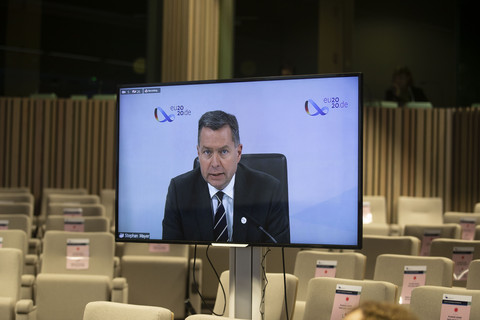[ad_1]

The German EU presidency has failed to make any meaningful leap forward on the contentious aspects of EU-wide asylum reforms.
But despite the failings, Germany’s federal interior state secretary Stephan Mayer on Monday (14 December) attempted to paint a rosy picture.
Speaking to reporters after a meeting of EU interior ministers, Mayer said the presidency had provided a new impetus.
“I think we have managed during the German presidency to put things back on the right track,” he said.
When pressed on details, he declined to say more.
“I can’t really go into details, right now as to the content of such discussions. I don’t wish to mention who said what,” he said.
He then claimed the progress should instead be seen relative to the heat of discussions over the very same issues five years ago.
He said that, back in 2015 and 2016, EU states refused to view migration as a European issue and made claims like “not our problem” or “it is a German problem”.
“Now you don’t hear that kind of sentence anymore from any EU member state and I regard that as progress,” he said.
The European Commission presented its new pact on migration and asylum in late September.
It had, up until its unveiling, made repeated claims of having ironed out most of the issues to create “a landing zone”.
The term was coined by the vice-president of the European Commission Margaritis Schinas, previously its chief spokesperson.
The “landing zone” statement suggested the commission had made the rounds of all 27 member states to break the impasse around sharing out asylum seeker arrivals.
The deadlock has for the past few years hovered around balancing vague concepts, such as “solidarity” and “responsibility”.
Numerous EU presidencies have tried breaking the deadlock. All have failed.
The EU Commission then introduced new plans for EU states to return failed asylum seekers through sponsorships in exchange for not hosting arrivals.
The hope was that the German EU presidency would use its political clout to squeeze concessions from recalcitrant EU states, such as Hungary and Poland.
Hungary and Poland, among others, refuse to taken in any asylum seekers landing on European shores. Hungary has also balked at the return sponsorship concept.
Now it will be up to the incoming Portuguese EU presidency, a much weaker member state, to succeed where Germany failed.
Covid has also complicated efforts, said EU commissioner for home affairs Ylva Johansson.
“It is very difficult to make major achievements on this but we have made significant steps forward,” she said, speaking alongside Mayer on Monday.
She listed those achievements as finalising talks on the Blue Card directive, a law that seeks to create legal pathways for migrants into Europe.
There had also been wide agreement in other areas, such as shoring up external borders and leveraging visa agreements in order to get countries to take back their nationals, she said.
[ad_2]
Source link